|
|
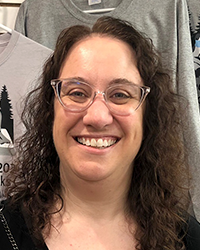 Jen Jen
|
 |
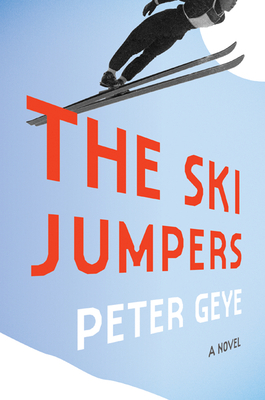
|
|
The Ski Jumpers
Peter Geye
The Ski Jumpers is a gem of a book. As always, Geye delivers beautifully written, sensitive material. In this novel, Jon is facing early onset-Alzheimer’s. He’s also been harboring a family secret for years and decides it’s time to come clean with his longtime wife (and arguably, soulmate), Ingrid. As Jon and Ingrid travel to their daughter and daughter-in-law’s home for a visit, Jon opens up to Ingrid. As a boy, Jon and his brother Anton were ski jumpers, like their dad, known as “Pops.” Jon has gone on to become a successful novelist and Anton owns a seedy bar. Jon and Anton have fallen out of contact, but when Pops passes away, they reconnect. It’s clear from the writing that Geye knows a thing or two about ski jumping himself, and in fact, he was once a competitive ski jumper. I’ve never paid much attention to ski jumping, it’s not a sport I follow, but that’s not required to enjoy this book. We hosted Geye for an event on October 1 and the thing he said that has stuck with me (and likely will for a long time) is, “I quit ski jumping at 19 and regretted it, but having quit that and knowing the pain of quitting stopped me from ever quitting writing.” Thank goodness.
|
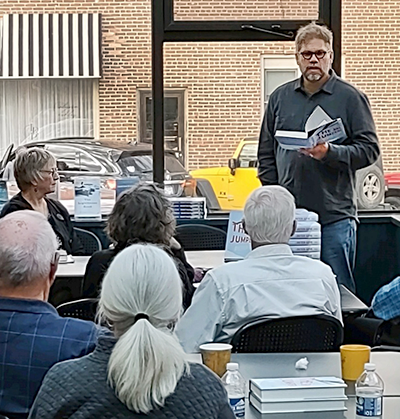 |
| |
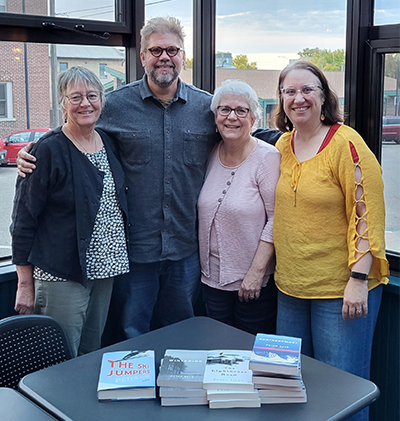 |
|
 |
Peter Geye with his Beagle and Wolf fan club. Left to right: Brita, Peter, Sally, Jen.
|
|
|
| Peter Geye reading from The Ski Jumpers at our recent event with him. |
| |
|
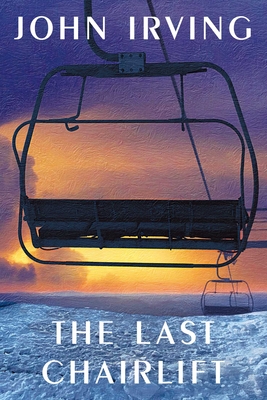 |
|
The Last Chairlift
John Irving
Recently I took a road trip to St. Louis and back. I figured this was the perfect time to listen to the The Last Chairlift, which clocks in at 900+ pages, or 32 hours and 45 minutes. It was a good choice! Admittedly, I’m still not finished listening to it (round trip to St. Louis is 24 hours.) Our narrator is Adam, the son of a skier named Rachel, better known as Little Rae, and an unknown father. The book is about family (especially those unconventional but loving), coming of age, wrestling (but not really as most sports in books aren’t really about sports), ghosts, aging, writing, and loyalties. While Adam is an only child, his cousin Nora is close enough to him to be his sibling. Nora’s longtime girlfriend Em, a pantomimist who chooses not to speak, is like a sister-in-law. As the book progressed, I was reminded of Chelsey Johnson’s novel, Stray City, in that the characters of the LGTBQ+ community feel like what’s normal and Adam, who is heterosexual, seems a bit of an outsider. I like books that cover years, and The Last Chairlift definitely does that. Irving has a charming habit of having a number of names for every character that is in no way confusing: for example, Elliot Barlow = The Snowshoer = The Little English Teacher. The nicknames keep the reader on his/her toes about all the elements of characters. Every character gets a deep dive from Irving. For book groups that choose to read and discuss this book, I guarantee no one will complain, “I wish the author had told us more about Character X.” All the details are included. The narrator of this audiobook is a good one (and if you speed up the pace to 1.1, you can save a bit of time without losing the quality of the voice  .) .)
|
| |
|
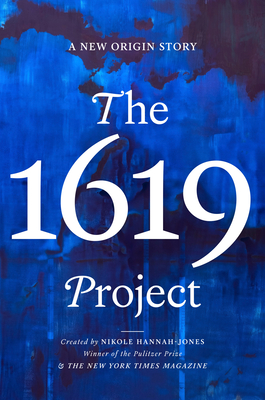 |
|
The 1619 Project: A New Origin Story
edited by Nikole Hannah-Jones
I’m reading/listening to The 1619 Project: A New Origin Story. Often I alternate between reading print and listening to audio, and this is an ideal one in which to alternate. Each chapter contains a long piece on a particular topic/slice of history, a piece of poetry, and some short bits of history for context. Often photographs are included. I like listening to the longer pieces, especially because they are narrated by their author, but I like to see the shorter pieces (and of course the photographs) on the page. Our Current Events book club will be discussing this in November and I’m anticipating a good discussion about American history. If you’ve heard there’s been backlash to The 1619 Project, know that the criticisms were primarily aimed at the original 1619 Project that was published in the New York Times, not this book. Those criticisms, too, I think will lend themselves to discussion. (Should we throw out the baby with the bathwater?)

|
|
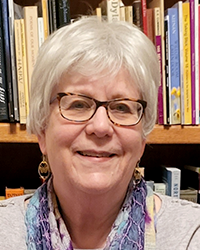 Sally Sally |
|
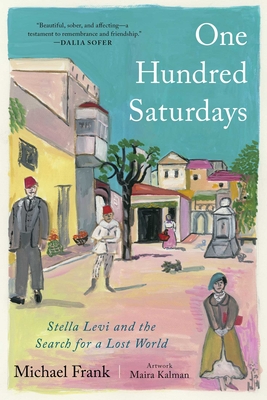
|
|
One Hundred Saturdays
Michael Frank
This is the best book I’ve read recently!
In 2015, Michael Frank had a chance meeting with Stella Levi at a lecture on Nazi Fascism at NYU. Levi, who was born in 1923, is a Holocaust survivor. Over the next six years, Frank and Levi met on many Saturdays, and she slowly revealed the story of her life to him.
Levi grew up in the Juderia (Jewish quarter) on the island of Rhodes. The daughter of a successful businessman, she passionately wanted to follow in her older sister’s footsteps and receive an education. At the age of 14, she placed a packed suitcase by the front door of her home as a symbol of her intention to do so. Her stories of her early years reveal a close community and family. That changed with the arrival on Rhodes of the Fascists who would ultimately destroy the community and send 1650 people, including Stella, her sister, and their parents to Auschwitz.
The sisters survived the ordeal; their parents did not. The stories of this part of Stella’s life are harrowing and important for us to read, internalize, and remember.
Finally, Stella tells of her long post-war life. This part of the book is poignant, for the dreams and aspirations of the 14-year-old who desired an education were not the lived experiences of the survivor of the camps.
The book relates brutal experiences, but Stella’s indomitable spirit gives hope to her story. The survivors of the camps are dying of old age, but it is crucial that their stories do not die with them. Don’t miss reading this book—it may well be the most important one you read this year. |
| |
|
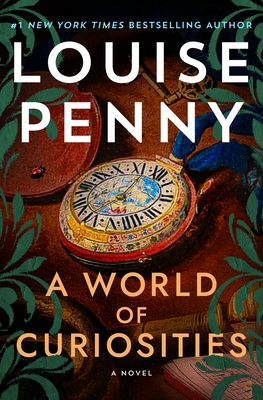
|
 |
A World of Curiosities
Louise Penny
I’m a huge fan of Louise Penny’s series of mysteries featuring Chief Inspector Armand Gamache of the Québec Sûreté. They’re mysteries, yes, but the appeal to me is the psychological insight into the characters and the growth and relationships of the continuing characters across years and cases.
This, the 18th book in the series, takes place in Three Pines, as do many of the books which have preceded it. Three Pines, an isolated village in Quebec, is populated with a variety of inhabitants, many of whom have discovered the town after the wider world has let them down.
A case from the past of Gamache and his second-in-command (and son-in-law) resurfaces in this latest book, threatening the tranquility of Three Pines and the lives of several of its inhabitants.
To say more would reveal spoilers, which I’m not going to do. I will say, though, that the book is a worthy addition to the series I’m so fond of.
Note: This book will be released November 29.
|
| |
|
|
|
|
|
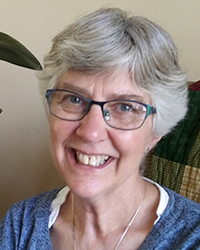
Ann
|
|
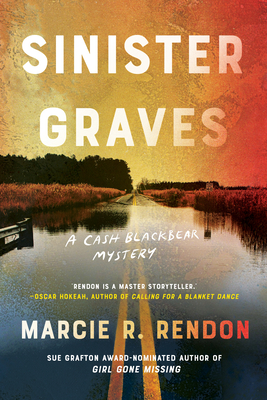
|
|
Sinister Graves
Marcie Rendon
Cash Blackbear is a nineteen-year-old Ojibwe woman. She lives in the Red River Valley, where she is a college student, farm worker, and avid pool player. Cash also has been known to help her guardian, Sheriff Wheaton, solve crimes. Sinister Graves is a story involving the deaths of two unidentified Native American women and, in one case, a missing newborn. The investigation leads Cash to the White Earth Reservation, where she grew up. Based on information from the locals, she ends up at a small rural church where she finds two mysterious graves and becomes involved in the lives of the pastor and his wife. Cash’s gifts of intuition and bravery help her to navigate dangerous situations in her quest to solve mysteries. Sinister Graves is Marcie Rendon's third Cash Blackbear mystery. As a reader, it has been intriguing to follow Cash Blackbear as she develops as a detective and makes decisions regarding her future. I'm looking forward to finding out what comes next for her. |
| |
 |
 |
 |
|
|
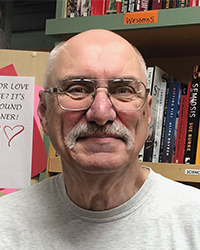
Bob |
|
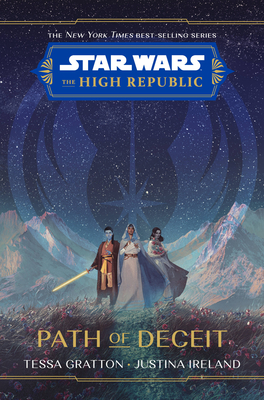
|
|
Star Wars: The High Republic: Path of Deceit
Tessa Gratton and Justina Ireland
This book is another in the Star Wars Series that brings out the new and different. It’s early on in the galaxy with respect to exploration, pre-Empire. The Jedi Order is spreading out, contacting countless new planets and species. The Force is strong but not every newly explored world is buying into it. And not everyone wants the Jedis around. So we see the trials and tribulations of the young Padawan, Kevmo Zink, sent out to spread the word. One of his first contacts is with Marda Ro on the planet Dalna. They butt heads right away as she tells him he is using the “Force” incorrectly and he should be following the “Path.” Ah, the never-ending battle between beliefs and faith. How do you respond when others think you are completely wrong? Can you win them over? Maybe, but it could take a while. A good read.
|
| |
|
|
|
|
|
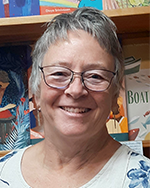
Brita |
|
Murder She Read:
…It must be the season-Halloween and all.
Working in a book store gives one plenty of opportunities to see intriguing titles, to hold and shelve books that for one reason or another, keep silently, insistently, haunting you, calling out “Read me, read me.” Two such books recently reached out to me.
|
 |
|
The Silent Patient
Alex Michaelides
This book was featured repeatedly this year in the Bestsellers display and the Book Club choices sections at Beagle & Wolf Books. For good reason, it turned out. The book took off at a fast pace describing artist Alicia Berenson as she was found silent and bleeding copiously, near her murdered husband’s body. Through the twists and turns of possibility, the story moves along quickly and unpredictably to a masterful conclusion, which you don’t see coming at all. It leaves a lot for the memory and left me with a big desire to read his other book, The Maidens, as well. |
| |
|
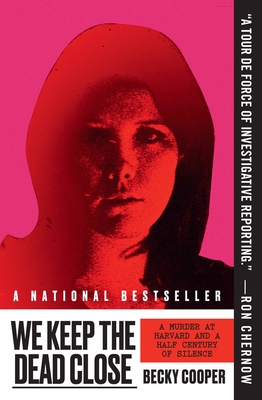
|
|
We Keep the Dead Close
Becky Cooper
This book is shelved in the True Crime section of our store. Books from this section have a special hold on me, since they were actual happenings. The January 7, 1969, murder of Harvard archeology co-ed, Jane Britton, had remained unsolved for fifty years until another Harvard grad student, Becky Cooper, found herself so intrigued by the web of myth, cover-up, ivy league academic hierarchy, positioning, and gender based discrimination that she committed herself to solving the murder. Cooper is a stickler for detail as she conscientiously works back into the events, shedding light onto the machinations of academia as well as the murder itself. While the book was a bit slow going at times, it remains a masterfully told tale, one which I highly recommend. |
| |
|
|
|
| |
|
 |
|
|
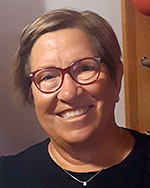
Doni
|
|
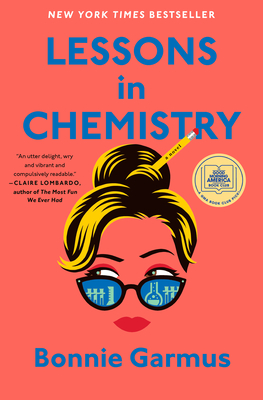 |
|
Lessons in Chemistry
Bonnie Gamus
Elizabeth Zott is brilliant and beautiful, both problems in the misogynistic chemistry lab where she works in the early 1960’s. She is disrespected by everyone she works with, men and women alike, except for the lab’s most celebrated scientist, who falls in love with her. As life unfolds, Elizabeth finds herself a single mother trying to survive on the pittance paid by the lab.
Outspoken and articulate, Elizabeth lands a job as host of the afternoon cooking show Supper at Six, after an encounter with the show’s producer where she gives him a chemistry lesson on the nutritional needs of a growing child. Although she is a reluctant star, Elizabeth’s show is affirming and educational and a great success.
This book explores the impact the sexual mores of the time meted out, from sexual assault to the casual misogyny of everyday encounters. Elizabeth often proclaims, “Chemistry is change,” and the books invites us to explore how times have changed for women in our culture. This book is funny and thought provoking with a nice, tidy ending.
|
| |
|
|
|
|
|
| |
|
|
|
|
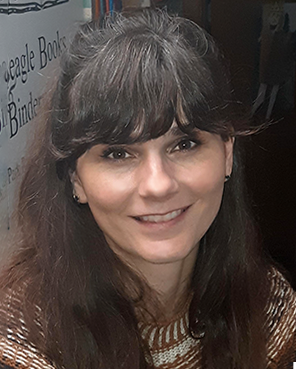
Gina |
 |


|
 |
The Wall
Marlen Haushofer
A woman is on a trip at a hunting lodge in the mountains of Austria. She wakes to discover her fellow travelers have not returned from the previous day’s hunt. She and the dog Lynx go off in search of the hunters only to find an invisible wall separating her from the rest of the world.
We learn of the woman’s two years behind the wall as she is rereading her journal. The bonds she creates with the animals that come into her life. How she adapts to her environment. Her identity in the past and the present.
Doris Lessing’s blurb on the back of the book states, “It is not often that you can say only a woman could have written this book” and I couldn’t agree more. This story talks about the drive women have to do the things necessary to keep everyone and everything sustained.
As a side note, I’ll add the ending is rather unexpected and leaves you thinking.
|
|
| |
|
|
|
|
|
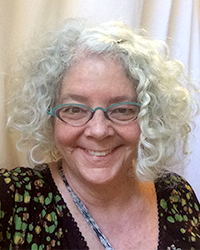
Hannah
|
|
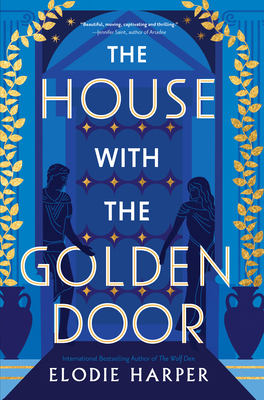
|
|
The House with the Golden Door
Elodie Harper
I bet just about everyone who reads The Wolf Den, the first book in this trilogy, will rush to get The House with the Golden Door. 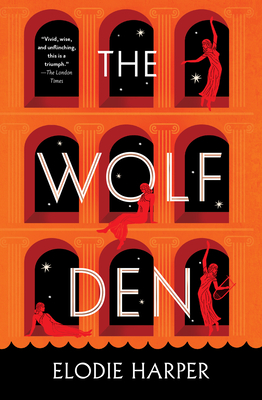 Now I’m distraught that the third book isn’t going to come for a while. Now I’m distraught that the third book isn’t going to come for a while.
The first book has a bittersweet ending for Amara, a woman born free in Greece but sold into slavery and bought by a pimp in Pompeii. The second book explores more about the lives of enslaved and freed women and men in Roman society, their precarious positions if supported by patrons, their friendships, and their desperate desire to keep families together. Amara is a strong but flawed woman in an impossible situation, fighting to stay safe and doing her best for those she loves. But doing one’s best isn’t always enough.
Elodie Harper is a journalist who knows Latin and has spent time in Pompeii. Her website has a fascinating blog about the ancient city, including photos of the actual buildings that were the inspiration for the Wolf Den brothel and the house with the golden door.
|
|
| |
|
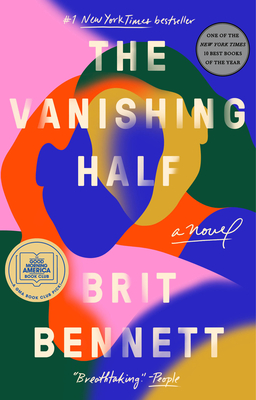
|
|
The Vanishing Half
Brit Bennett
There was a town in Louisiana so small it didn’t appear on any map. It was founded by a fair-skinned Black man who set out to cultivate a community of others like him, so that after a few generations everyone looked white. But people in neighboring towns all knew, and mistreated the citizens of Mallard accordingly. Twin girls were born to a descendant of the founder. They were inseparable and physically identical, but they had different personalities. They branched off in different directions as adults.
The characters in this remarkable book are so finely drawn that we care deeply about them and feel like we’re getting a taste of what it would be like to be in their situations. We forgive them their sins and rejoice in their successes.
Once I got into the book I saw that the book’s cover is brilliant. I can’t imagine what it would be like to write like Bennett: I only wish I had designed the cover.
|
| |
|
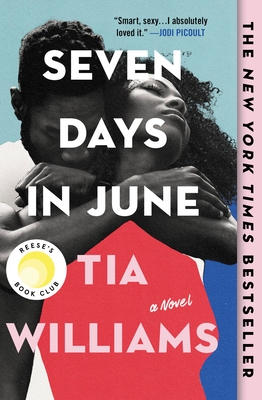 |
|
Seven Days in June
Tia Williams
This is the perfect follow up to The Vanishing Half. While Seven Days is light and sexy and lacks the gravitas of Vanishing Half, it has some of the same themes, and it makes you smile as you glide through the somewhat related story.
Eva is the author of a series of erotic romance novels about a witch and a vampire. Eva has debilitating headaches, a precocious 12-year-old daughter, memories of a crazy childhood, and writer’s block. She has no time or energy for a man in her busy New York life. Or does she?
In an interview with the author in the back of the book I learned something I wished I’d known as I read it. The author is speaking from experience when she describes the pain of chronic daily migraine headaches. I never realized how awful they are and am amazed at William’s overcoming them to become the accomplished author and woman she certainly is.
|
|
| |
 |
 |
 |
|
|
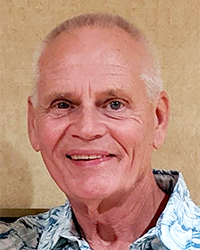
Lee |
|
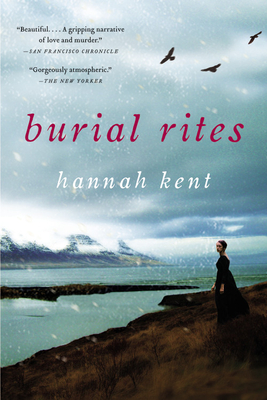
|
|
Burial Rites
Hannah Kent
This is historical fiction, based on the last days of a young woman, Agnes Magnúsdóttir, accused of committing murder in Iceland in 1828. The book opens with: "They said I must die". They said that I stole the breath from men, and now they must steal mine.”
After being found guilty, Agnes spends her last months housed with a farm family. Initially, the only person close to her is Tóti, an assistant minister that Agnes has, for no apparent reason, chosen to be her spiritual guardian. As time passes, though, the confined living quarters change the relationships that the members of the family have with Agnes.
The excellent writing unrolls Agnes’s life in haunting detail: It is an emotional read. |
| |
|
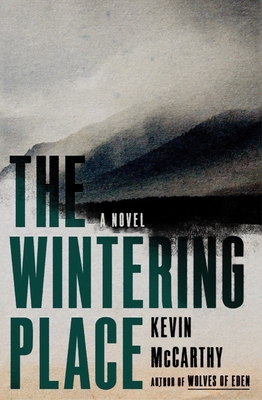 |
|
The Wintering Place
Kevin McCarthy
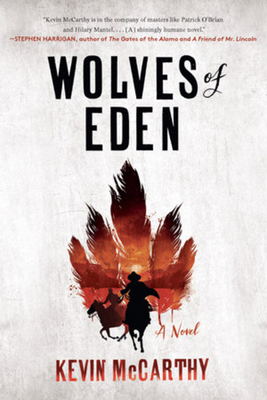 The Wintering Place by Kevin McCarthy is the sequel to Wolves of Eden. It can very definitely be read without having read Wolves of Eden, but I would probably suggest that the books be read in order because they are both so very good. The Wintering Place by Kevin McCarthy is the sequel to Wolves of Eden. It can very definitely be read without having read Wolves of Eden, but I would probably suggest that the books be read in order because they are both so very good.
Brothers and soldiers Tom and Michael Sugrue are struggling to survive. Tom had killed the owner of a brothel to rescue Sara, a half-Native woman, and then deserted. The two soon come across Michael, who has been badly wounded in a Lakota massacre at Fort Phil Kearny. Tom and Sara take Michael with them as they flee to the north.
Portions of the novel are narrated by Michael, in his journal, so do not expect the King’s English. He is, after all, a good Irish Catholic ... (I have seen some reviews where people disliked these chapters due to the dialect. I found them to be honest and revealing.) Tom does little speaking, as he took a Confederate ball through his mouth at Chickamauga, but the narrator provides us with many of his thoughts.
The story shows all the roughness of the Old West, without the gloss and glamour that appear in most novels and movies. (I guess that is a trigger warning, if the previous mentions of a murder and brothel were not sufficient.)
The three main characters are carefully and honestly developed. I found myself fully immersed in the story ... hoping that things might work out for the brothers and Sara, despite long odds against that happening.
Note: this book will be released November 15.
|
| |
|
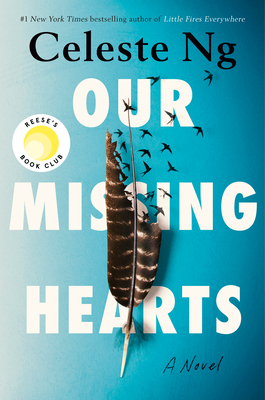 |
|
Our Missing Hearts
Celeste Ng
Bird is a 12-year-old whose mother, Margaret Miu, was forced into hiding when he was nine. How did this happen? She is of Chinese heritage and a line from one of her poems has become a rallying cry for revolutionaries hoping to reunite families whose children had been taken from them in the name of national security.
Bird and his father Ethan have disavowed her, though Ethan still lost his position as a professor at Harvard and now shelves books in the school’s library. And he and Bird have been allowed to live in a dorm room on campus.
Celeste Ng has given us a story of a dystopian future that is, perhaps, not very far from our own lives. The separation of children from their parents has been a repeating part of American history ... from slavery to Native American boarding schools to people seeking asylum on our southern border. And the animosity toward Asian Americans did not just start with the “Kung Flu” political rhetoric. By the early 1920s, various Congressional exclusionary acts kept virtually all Asian immigrants from citizenship, marrying Caucasians, or owning land. And, of course, the Japanese internment camps were established during World War II. And so many things are done in order to “preserve American culture”.
An important heroic presence in the novel are the libraries and the librarians, that can help us to keep all the stories alive.
Our Missing Hearts is a truly wonderful novel about family, love, and courage. |
|
| |
|
| |
|
|
|
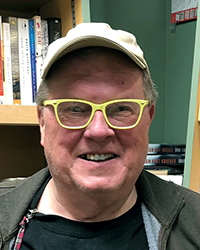
Tim
|
|
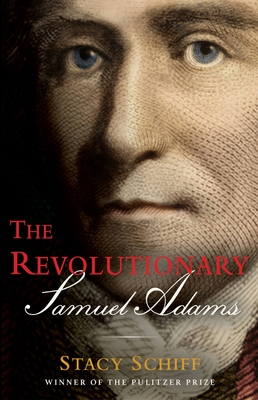
|
|
The Revolutionary Samuel Adams
Stacy Scott
To be really honest, I picked this book up thinking it was about John Quincy Adams. I was looking for a change of pace in my reading, and thought the American Revolution might be just the change I needed. I was right. This is mainly because I know so very little about the facts. What was it about American History in school that made it all so forgettable?
'To have a villainous ruler imposed on you was a misfortune. To elect him yourself was a disgrace." This is a quote I came across in the first two pages, and I have to tell you, I was immediately hooked. Samuel Adams was a pamphleteer, speaker, organizer, and 'democratic' pain in the a** (against the British) who almost single-handedly brought together the people of the greater Boston area to protest, and eventually actively resist the imposed British Colonial Government. He was one of the major organizers of the famous Boston Tea Party, which I shame facedly have to tell you, I knew only the barest of rumors that have come to us, represented as history. The truth of it is VERY different. I wonder what he would think of the bungled mess that passes for our politics today? I also wonder what he would think of the squandering of his courageous efforts, and the efforts of the other men and women, who risked their lives and fortunes to create this country? And just as a sidebar, I think he'd approve wholeheartedly Ukraine's valiant resistance.
|
| |
|
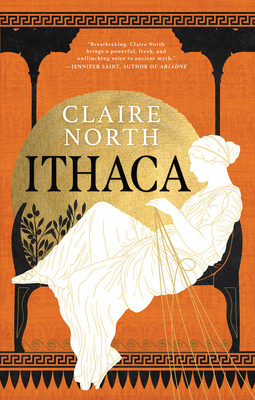
|
|
Ithaca
Claire North
This is the fourth book I've read recently where the author has taken a snippet of Homer's epic poem, The Odyssey, as the starting point of her tale. Claire North has done a brilliant job of expanding on some of the less explored characters in Homer's work, mainly Penelope, wife of the famous Odysseus. She was condemned to wait eighteen long, weary years for the return of her husband from the Greek victory at Troy. We're privy to her thoughts, her loneliness, and yes, her temptations. North narrates the story largely through the voice of Hera, Queen of the Gods, wife of the mighty Zeus. Interestingly, it must be said, Hera has frustrations, jealousies, and temptations of her own, in her marriage with the often neglectful and self-absorbed King of the Gods. For me, it was interesting having Hera, whispering confidentially to me, over my shoulder, a running commentary, her uncensored estimation of the actions of 'the mortals'. Often scoffing at their foibles and flawed understanding, of the roles the Gods had mapped out for them; which is a polite way of saying the mortals were being messed with at every turn by forces beyond their control. Interesting too, was discovering who was more subject to human flaws and jealousies, and who seriously strove to attain the ideals and genius of the Greek notion of Virtue, and why. I think this was one of the best books I've read in the last three years. |
| |
|
 |
|
The Boy and the Dog
Seishu Hasep
I'm between books! What I mean is, I have no all absorbing, primary book of interest underway just now, and I feel sort of 'at sea.’ The reason is that a couple of days ago I finished, The Boy and the Dog which is shortly coming out in the English translation. It's a curious post-earthquake and tsunami tale about a lost dog seeking to be reunited with a young boy. Simple enough in its structure, and I was beginning to feel it was a work of Young Adult Fiction; but NO!! The dog, named Tamon, spends time with several people while on his quest to find the child, and it becomes apparent that he's helping the people he encounters just as much as they're helping him. Enough so that I'll argue the tale is a modern day folk tale of Buddhist pilgrimage, of a reincarnated spirit, making its way towards spiritual resolution and fulfillment. My pallid description here might sound banal and maybe even commonplace, but the tale has resonated with me, in a remarkably intimate manner. To such a degree, that I wonder if this period of aimlessness, in seeking a direction in my future reading, isn't an unconscious need to take time to digest and meditate on, the lessons I've had encountering Tamon. If you're at all a 'pet person', and you know, in your bones, they're spirits living alongside of us, sharing our lives, you'll enjoy this book.
Note: this book will be available November 15
|
| |
|
|
|
|
|
Guest Review
Rachel |
|
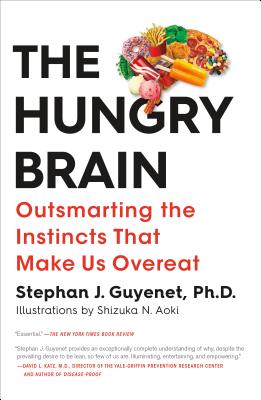
|
|
The Hungry Brain
Outsmarting the Instincts That Make Us Overeat
Stephan J. Guyunet, Ph.D.
Dr. Guyunet thoroughly and concisely reviews all the factors that contribute to overeating and presents these solutions:
Fix Your Food Environment
Get rid of tempting, calorie-dense foods that are easy to grab at home and work; by reducing availability, your cravings will subside. Limit the amount of visible food on counters/tables/desks, especially snack foods that are too easy to grab and eat quickly. Minimize your exposure to food advertising.
Manage Your Appetite
Choose foods that send strong satiety signals to the brain but contain moderate calories; these foods have lower calorie density, and higher protein and/or fiber content, and a moderate level of palatability (examples include fresh fruit, vegetables, potatoes, fresh meat, seafood, eggs, yogurt, whole grains, beans, lentils.)
Beware of Food Reward
Calorie-dense combinations of fat, sugar, starch, protein, and salt can trigger cravings, overeating, and unhealthy eating habits and lead to eating past the point of satiety. Instead eat simple foods that are less calorie dense.
Make Your Sleep a Priority
Restorative sleep has a major impact on eating behavior. Spend enough time in bed. Ensure your room is completely dark. Keep your bedroom cool. Only use your bed for sleep and sex. Circadian rhythm affects sleep quality and is regulated by going to bed and getting up at the same time every day
Move Your Body
Exercise increases the number of calories you use, making it less likely you will overeat. Physical activity helps maintain the lipostat (fat thermometer) in the brain which encourages a naturally improved level of leanness.
Manage Stress
Give your threat response system the right cues to prevent emotional eating. First identify if you are a stress eater, then identify the stressor(s) (examples include work, money, health, caregiving, relationship conflict, lack of social support). Try to mitigate the stressor by making a plan or embracing mindfulness. Replace stress eating with another activity (talk to a friend, read, exercise, take a bath, garden, have sex). Remove comfort food from your environment.
This book is for you if you want a thorough scientific explanation of why the author recommends the above strategies to outsmart overeating.
Note: a version of this review was published in a recent edition of the Park Rapids Enterprise and is used with the permission of the author.
|
|
|
Would you like to be a guest reviewer?
Email Sally at sally@beagleandwolf.com |
| |
|
|
|
|
|
— page top —
|
|

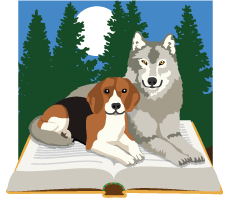





 Sally
Sally





























